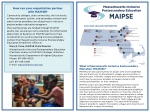About MAIPSE
The Department of Higher Education administers and funds Massachusetts Inclusive Postsecondary Education (MAIPSE) to support partnerships between two- and four-year public colleges and universities in Massachusetts, local school districts and adult state disability agencies.
Pathways to Access
There are two pathways to access an inclusive public college education through Massachusetts Inclusive Postsecondary Education:
- In-school pathway: Eligible students, 18-22 years, who are receiving transition services. These students in MAIPSE programs are dually- enrolled in college and supported by transition services through the school district.
- Out-of-school pathway: Eligible students have exited school and special education services and receive services from an adult services disability agency, such as Department of Developmental Services and MassAbility .
Student Participation
Students enrolled in both pathways have access to the same level of support in college. They are fully included in the campus community as they develop their skills in career-planning and employment, self-advocacy, and self-determination to support their postsecondary interests and activities.
For example, students participate in:
- Person-centered planning to determine a students' goals and needs
- College or university courses that support their goals
- Social activities on campus, including student organizations and other extracurricular activities of interest to the student
- Paid work and internships
- Independent living and independent travel
Eligibility
Students eligible for participation in Massachusetts Inclusive Postsecondary Education include persons who:
- Are 18 or 19 years old and have: (A) a severe intellectual disability, severe autism spectrum disorder or other severe developmental disability; and (B) the Individualized Education Program team determined they are eligible for transition services.
- Are 20 or 21 years old and have: (A) a severe intellectual disability, severe autism spectrum disorder or other severe developmental disability; and (B) not received a high school diploma.
- Students with severe intellectual disabilities, severe autism spectrum disorders or other severe developmental disabilities over the age of 21 who have not received a high school diploma. For persons over the age of 21 public institutions of higher education may limit participation to those who receive support from the Department of Developmental Services, the MassAbility , or other state agencies.
Purpose of MAIPSE
Evidence shows that students benefit academically and transition to young adulthood more readily when they can engage in the array of academic, social, career development, and individual self-development activities that are typical for all college students on a campus, rather than staying at high school. Students participating in MAIPSE quickly establish new social networks, participate in campus-wide events, learn to use public transportation to and from campus, acquire academic knowledge and skills, and build strategies to find fulfilling work. Most importantly, MAIPSE students grow into more independent decision-makers who are better equipped to define their own personal and career goals, and determine how to achieve them. Not only have MAIPSE programs proven to be important learning experiences for students, they have also supported the development of more inclusive college and university communities. To this end, they strengthened person-centered policies and practices for everyone involved in the transition experience, including students, family members, school personnel, and agency staff.
Student participation in this grant program may be incorporated into a student's transition individualized education plan or individualized support plan, as determined through the school district's or agency's processes.
Key Concepts and Standards
Students with severe intellectual disability, autism, and other developmental disabilities who, until recently, had few opportunities to continue their education beyond high school, are now pursuing college. This is possible because of expanding ideas about how postsecondary education can benefit a wide range of students. Supported Education is grounded in three principles:
- Increasing individual skills
- Increasing support from the environment
- Maximizing the fit between the individual and environment
Students need to be given the chance to experience adult learning in an inclusive setting with support and guidance. Download the Think College Standards for inclusive higher education for more information.

